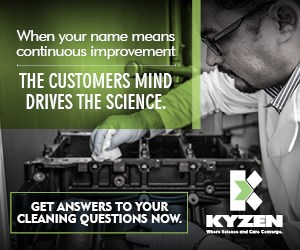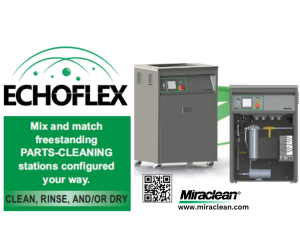Cleaning and Rust Inhibition
My employer orders metal pipe fittings (elbows, etc.) from China and stores them on site. The fittings are covered in oil to prevent rust, and before we can use them we send them out to be thermal cleaned to burn off the oil. We then receive them and run them through our powder coat line. I would like to eliminate this wasteful motion and receive them ready-to-use.
Q. My employer orders metal pipe fittings (elbows, etc.) from China and stores them on site. The fittings are covered in oil to prevent rust, and before we can use them we send them out to be thermal cleaned to burn off the oil. We then receive them and run them through our powder coat line.
I would like to eliminate this wasteful motion and receive them ready-to-use, however, they will need to be stored for long periods without rusting. I was thinking of drop shipping them from China to our local thermal cleaner and have them shipped to us clean, then stored in a dry box until we need to coat them. I also thought about having them shipped to our local thermal cleaner and having them use a coat with a vapor corrosion inhibitor (VCI) that doesn’t require us to keep them in a dry box and that can be powder coated over without further processing. Do you have any suggestions? B.R.
A. Your situation does seem like it could use some improvement. You have two possible options. One would be to have the manufacturer of the pipe fittings use a strong VCI intended for overseas shipments. VCI stands for vapor phase corrosion inhibitor, and therefore, is not coated onto the part. The VCI works effectively in a closed environment. It typically takes the form of a corrosion inhibitor impregnated foam or paper that will volatilize over time. In order for the vapor phase inhibitor to be effective, it will need to stay in an enclosed space when it is volatilized. You may then be able to use the parts straight out of the storage container. This process may take some time to get set up with your parts supplier and potentially several trial-and-error shipments to make sure it is effective.
As mentioned, your other alternative is to have them dropped shipped to your thermal degreasing company. After cleaning and repackaging, they could be sealed in boxes and returned to you. It may be necessary for them to pack your parts in a sealed container with a VCI to minimize the chance of those parts rusting in shipment or inventory. You may also want to consider a third option, which would be to bring this cleaning process in house. This would eliminate the outsource costs, shipping and the vapor phase corrosion inhibitor entirely.
Related Content
-
From Drain to Gain with Smart Wastewater Recovery
Incorporating digital monitoring to maximize performance.
-
Corrosion Resistance Testing for Powder Coating
Salt spray can be useful to help compare different pretreatment methods and coatings but it does not tell us much about the corrosion resistance of a part over time in the field. Powder coating expert Rodger Talbert offers insights into how to get a better idea of how to improve a part’s corrosion resistance in the real world.
-
Replacing Open-Top Vapor Degreasing in Aerospace Manufacturing
Options and considerations for cleaning aerospace parts as regulations tighten on vapor degreasing solvents.
















